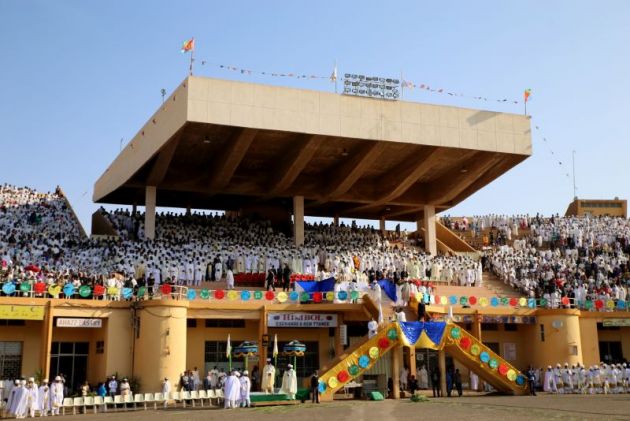Peace agreement between Ethiopia and Eritrea hailed by World Council of Churches, UN

After the leaders of Ethiopia and Eritrea signed a declaration saying that the long-standing war between the two countries is over, World Council of Churches general secretary Rev. Olav Fykse Tveit hailed the agreement as opening a new door for peace in the region.
The countries had a border conflict between 1998-2000, which saw tension for many years, but the neighbors have agreed to re-establish trade and diplomatic ties.
"I am very encouraged by this landmark agreement that carries with it great hope for communities and families who have waited for so long for justice and peace," said Tveit.
"We stand by you as you continue your daily lives with this new sense of hope."
The peace declaration came during a meeting between the two countries' leaders in Eritrea's capital, Asmara.
The summit marked the first time Eritrean president Isaias Afewerki and Ethiopian prime minister Abiy Ahmed had met for nearly two decades.
The Prime Minister of landlocked Ethiopia, Abiy Ahmed has said his government wants to implement a deal restoring relations with Eritrea quickly to "make up for lost opportunities" after a two-decade military standoff, Al Jazeera reported.
Abiy signed an agreement with Eritrean President Isaias Afwerki on July 9, formally declaring that the "state of war" between the neighboring countries was over.
"My government is keen to implement the terms we laid out in our Joint Declaration so as to quickly make up for lost opportunities and create even better ones for our people", Abiy said in a letter to Isaias that was posted on Twitter by Abiy's chief of staff on July 10.
Eritrea and Ethiopia of are two countries where Christianity has been present since a few hundred years after the birth of Christ, most of the believers, followers of the Orthodox tradition.
In Eritrea many believe that Christians and Muslims account for about half each of the estimated 6 million people from the reclusive country, to which a WCC delegation made a solidarity visit last year.
Also on July 10, Ethiopian Airlines said in a statement that the fir mist passenger flight between Ethiopia and Eritrea would take place on July 18.
The African aviation giant said it would initially operate a once-a-day return flight between Addis Ababa and Asmara, but planned "very quickly" to operate multiple passenger and cargo flights daily.
'NEW CHAPTER OF PEACE AND FRIENDSHIP'
"With the opening of a new chapter of peace and friendship between the two sisterly countries, we look forward to starting flights to Asmara with the B787," said chief executive officer Tewolde GebreMariam.
"The resumption of air links will play a critical role in boosting the overall political, economic, trade and people-to-people ties between the two sisterly countries."
WCC's Tveit said, "While we observe with great joy this moment of peace, we also pause to mourn the lives of the tens of thousands of people who have been killed in the conflict.
"We pray peace will not only be in the news headlines but also bear out in the daily lives of people as they face a new future. We encourage the churches to be engaged in the implementation of the peace process."
The members of the UN Security Council in New York commended the signing of the Joint Declaration of Peace and Friendship on July 9 by the President of Eritrea, and the Prime Minister of Ethiopia.
The noted the commitment by both parties to resume diplomatic ties and open a new chapter of cooperation and partnership. They also took note of the five-point-plan, and welcomed the agreement to implement the decision by the Ethiopia-Eritrea Boundary Commission.
The Eritrean–Ethiopian War, one of the conflicts in the Horn of Africa, took place between Ethiopia and Eritrea from May 1998 to June 2000, with the final peace only agreed to in 2018, 20 years after the initial confrontation.
Earlier, from 1961 until 1991, Eritrea had fought a long war of independence against Ethiopia.
The Ethiopian Civil War began on 12 September 1974 when the Marxist Derg staged a coup d'état against Emperor Haile Selassie.
It lasted until 1991 when the Ethiopian People's Revolutionary Democratic Front (EPRDF)—a coalition of rebel groups led by the Tigrayan People's Liberation Front (TPLF)—overthrew the Derg government and installed a transitional government in the Ethiopian capital Addis Ababa.
The Derg government had been weakened by its loss of support due to the fall of communism in Eastern Europe.